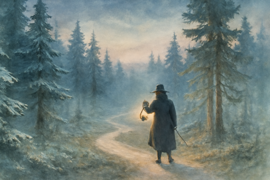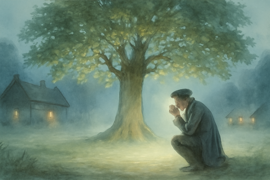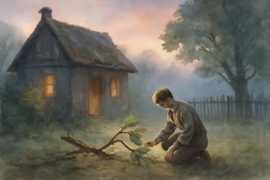Introduction
Deep in the undulating fields and snow-bound forests of nineteenth-century rural Russia stood the tiny hamlet of Zarevo, where every dawn brought the promise of hardy labor but rarely the bounty of abundance. The thatched cottages, built from aged timber and moss-clad stones, huddled together against the chill winds sweeping in from the distant taiga. Smoke curling from the chimneys spoke of simple porridge simmered over hearth fires; the occasional bleat of a goat or cluck of a hen broke the stillness of dawn. Ivan Petrov, a humble cottager whose life revolved around coaxing what little the frozen soil would yield, felt a hollow ache he could not name—an unrelenting yearning for comfort beyond the bare essentials. It was said among the villagers, in hushed tones by the firelight, that beyond the willow-bordered stream grew an ancient lime tree, its gnarled bark wrapping roots deep into the earth, housing a spirit that granted wishes whispered at moonrise. Some scoffed at such talk, others feared the old magic, but to Ivan—facing another harsh winter without hope—it offered a fragile thread. On a night when the wind howled like wolves across the open fields, Ivan made a silent vow: if the lime tree’s spirit could ease even his smallest burden, his family’s daily toil might at last yield peace to their weary hearts.
The Cottager’s Discovery
Ivan set out just as the first stars appeared, his breath rising in delicate clouds that vanished before they could form. In one hand he carried a lantern, its dim glow revealing a narrow woodland path blanketed by fallen pine needles. The trees stood like silent sentinels, limbs heavy with frost, while an otherworldly hush pressed upon him, broken only by the crackle of dried twigs beneath his boots. He recalled the hushed voices around the village well, where old Rabina swore she saw children freed from endless hunger after a wish beneath that same lime tree. A flicker of hope urged him on, though every rational thought warned of superstition.

[Image]
Greed’s Whisper
Triumph swelled in Ivan’s chest as he realized the lantern’s glow had fallen upon broad leaves shimmering silver in the moonlight. He had found it—the ancient lime tree, its trunk thick and knotted like the worn hands of an elder. The branches swept low, as though beckoning him. Heart pounding with awe, Ivan knelt and pressed his palm to the bark. He closed his eyes and whispered, “Feed my family enough food to last the season, that we may never know the torment of empty cupboards.” A breeze stirred overhead, rustling the leaves as if in silent counsel. For a moment, the forest held its breath.

As Ivan returned home at dawn, he half-expected a miracle. Yet beyond the edge of Zarevo, where frozen furrows once lay barren, rows of green shoots peeked from thawed soil. In his humble hut, a steaming pot of barley porridge bubbled on the hearth—extra casks of honey and saltfish stood neatly on a rough-hewn shelf. His wife, Marfa, awoke, her tired eyes widening at the sight of plenty. Ivan felt pride flare within him, the ache of want replaced by hope.
But as the days passed, a sharper need gnawed at his heart. The first wish granted, Ivan’s thoughts grew restless. Some villagers passed in praise, others in envy, and in their words he heard not caution but expectation. He began to wonder: if food could come so easily, what else might he claim? Under moonlit skies, he visited the tree again. His second wish sprang not from necessity but desire: a warm wooden chest of gold coins to buy livestock and cloth. Yet as with the first, the tree’s leaves quivered in silence before releasing their magic.
When dawn lit Zarevo’s rooftops, a modest chest glinted at Ivan’s feet. He opened it to find copper coins that sang against one another like chimes. Relief gave way to elation—but also to unease. Would this cycle find an end, or would Ivan, driven by longing, lose more than he gained?
The Final Lesson
The gold’s glitter did little to still the hollow swell in Ivan’s chest. Sheep and goats, fine cloth and sturdy plows—all arrived to furnish his household, but with each addition came fresh dissatisfaction. He watched as neighbors traded tales of envy, children played near the yard fence, and Marfa’s gentle laughter gave strength to his mornings. Yet Ivan felt he deserved more—ranked above the need for simple joys, he craved the greatest gift: a life free of hardship or worry.

Under a swollen harvest moon, Ivan returned to the tree for the third time, voice thin with exhaustion. “Let me have a life of ease and comfort, so that hunger and toil may never find me again.” He pressed his palm to the bark, but the tree’s leaves remained motionless. The hush deepened until Ivan, eyes stinging with tears, felt the weight of his greed. In that stillness he recognized the truth: the tree had granted him more than mere bounty—it had given him the chance to learn contentment, which he had squandered in pursuit of more.
A sudden wind snapped through the branches, and Ivan staggered back. When he dared to open his eyes, he saw not the glint of coins at his feet but a simple, scraggly sapling, half its branches bent and brittle. The gold chest—once so full—was empty, and his fields lay bare as before. In a breathless moment of despair, Ivan fled back to his cottage, heartsick and ashamed.
At dawn, he found Marfa by the hearth, a loaf of dark rye bread in hand and a bowl of steaming soup. Their small home, though bare, glowed with warmth and love. In the candlelight, Ivan saw what he had missed: generosity in her eyes, laughter in their children’s play, pride in labor shared. He knelt and vowed never again to seek magic over meaning. The lime tree’s greatest gift hadn’t been wealth but the test of his spirit—one he had almost failed.
Conclusion
When the last golden leaf drifted from the broken sapling, Ivan stood with weathered hands clasped and eyes clear with resolve. He had chased every wish but found emptiness in abundance and true wealth in simple grace. In the days that followed, he returned to his humble fields, sowing grain with Marfa’s laughter at his side and their children perched on mossy stones, wide-eyed with wonder at the dawn. Each furrow he turned was not a burden but a promise that honest work would honor the lessons of the lime tree. Neighbors came to see the change in Ivan’s posture—no longer bent by restless longing but standing tall in quiet contentment. And though the enchanted tree faded into memory, its spirit lived on in every kind act, every shared meal, every moment of gratitude glowing in the hearts of Zarevo’s people. In the end, the parable of the lime tree became the village’s greatest teaching: that true magic lies not in granted wishes but in accepting life’s gifts with an open, grateful soul. It is there, within the humble choices of each day, that wisdom blossoms like the finest bloom under the clearest sky.
From that time forward, Ivan’s name was spoken not for riches amassed but for the generous heart he nurtured. The lime tree, its bark long gone, remained alive in story and song—a reminder that every wish carries the weight of consequence, and every heart, content or restless, holds within it the truest measure of wealth: the grace to cherish what one already has. Ivan learned that when the world’s blessings are counted one by one, contentment grows—and that is the most enduring magic of all.


















